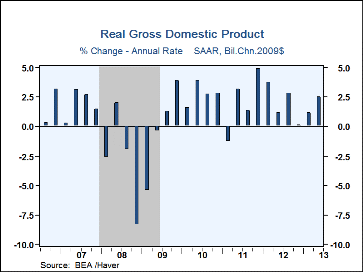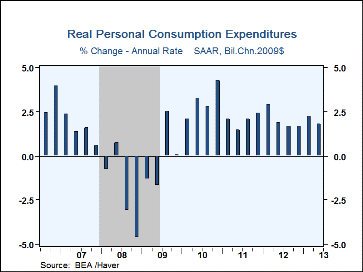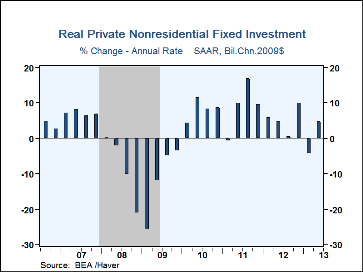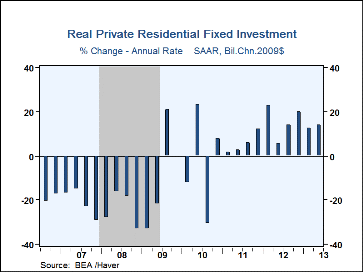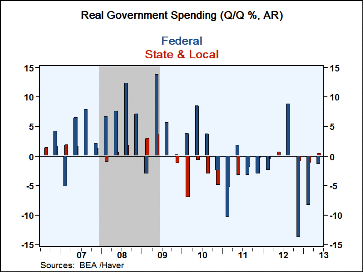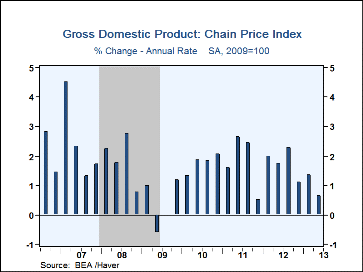 Global| Sep 26 2013
Global| Sep 26 2013U.S. GDP Growth Is Unrevised
by:Tom Moeller
|in:Economy in Brief
Summary
The third estimate of U.S. economic growth last quarter of 2.5% (AR, 1.6% y/y) was the same as last month's figure. The rise was near the expected 2.6% gain in the Action Economics Forecast Survey. Nevertheless, the figure represented [...]
The third estimate of U.S. economic growth last quarter of 2.5% (AR, 1.6% y/y) was the same as last month's figure. The rise was near the expected 2.6% gain in the Action Economics Forecast Survey. Nevertheless, the figure represented the fastest rate of economic growth since Q3 2012. After tax corporate profits growth was revised up to 8.5% (5.3% y/y).
The net export effect on GDP growth was revised to slightly negative. Exports grew at an 8.0% rate (2.0% y/y) but imports rose at a 6.9% rate (1.2% y/y). The contribution to growth from inventory accumulation was revised slightly lower to 0.4 percentage points. These downward revisions were offset by an upwardly revised estimate of growth in final sales to domestic purchasers of 2.1% (1.5% y/y), its fastest advance since Q3'12.
Government purchases declined at a 0.4% annual rate (-2.1% y/y), the same as reported initially. Federal government spending fell 1.6% (-4.1% y/y) while state & local spending improved 0.4% (-0.5% y/y). Improved growth in capital spending of 4.7% (2.4% y/y) reflected a 9.4% rise (5.1% y/y) in real spending on information processing equipment. Growth in residential investment was raised to 14.2% (15.2% y/y). Growth in personal consumption remained at 1.8% (1.8% y/y), held back by fewer new vehicle purchases. Spending on home furnishings & equipment, however, grew at a strong 9.1% rate (5.8% y/y) as did apparel purchases at a 6.0% rate (2.7% y/y).
Estimates of price inflation were reduced slightly. The GDP chain price index grew at a 0.6% rate last quarter (1.3% y/y), its weakest rise since Q4'11. The PCE price deflator dipped slightly (+1.1% y/y), held back by the decline in energy prices. The price index for business fixed investment rose at a 1.2% rate (1.1% y/y) but the residential investment price index rose at a strong 5.1% annual rate (4.7% y/y).
The latest GDP figures can be found in Haver's USECON and USNA databases; USNA contains basically all of the Bureau of Economic Analysis' detail on the national accounts, including the new integrated economics accounts and the recently added GDP data for U.S. Territories. The Action Economics consensus estimates can be found in AS1REPNA.
| Chained 2009 $, %, AR | Q2'13 (3rd Est.) | Q2'13 (2nd Est.) | Q2'13 (Prelim) | Q1'13 | Q4'12 | Q2 Y/Y | 2012 | 2011 | 2010 |
|---|---|---|---|---|---|---|---|---|---|
| Gross Domestic Product | 2.5 | 2.5 | 1.7 | 1.1 | 0.1 | 1.6 | 2.8 | 1.8 | 2.5 |
| Inventory Effect | 0.4 | 0.6 | 0.4 | 0.9 | -2.0 | -0.1 | 0.2 | -0.2 | 1.5 |
| Final Sales | 2.1 | 1.9 | 1.3 | 0.2 | 2.2 | 1.7 | 2.6 | 2.0 | 1.0 |
| Foreign Trade Effect | -0.1 | 0.0 | -0.8 | -0.3 | 0.7 | 0.2 | 0.2 | 0.2 | -0.5 |
| Domestic Final Sales | 2.1 | 1.9 | 2.0 | 0.5 | 1.4 | 1.5 | 2.4 | 1.8 | 1.5 |
| Demand Components | |||||||||
| Personal Consumption | 1.8 | 1.8 | 1.8 | 2.3 | 1.7 | 1.8 | 2.2 | 2.5 | 2.0 |
| Business Fixed Investment | 4.7 | 4.4 | 4.6 | -4.6 | 9.8 | 2.4 | 7.3 | 7.6 | 2.5 |
| Residential Investment | 14.2 | 12.9 | 13.4 | 12.5 | 19.8 | 15.2 | 12.9 | 0.5 | -2.5 |
| Government Spending | -0.4 | -0.9 | -0.4 | -4.2 | -6.5 | -2.0 | -1.0 | -3.2 | 0.1 |
| Chain-Type Price Index | |||||||||
| GDP | 0.6 | 0.8 | 0.7 | 1.3 | 1.1 | 1.3 | 1.7 | 2.0 | 1.2 |
| Personal Consumption | -0.1 | 0.0 | 0.0 | 1.1 | 1.6 | 1.1 | 1.8 | 2.4 | 1.7 |
| Less Food/Energy | 0.8 | 0.8 | 0.8 | 1.4 | 1.3 | 1.2 | 1.8 | 1.4 | 1.3 |
Tom Moeller
AuthorMore in Author Profile »Prior to joining Haver Analytics in 2000, Mr. Moeller worked as the Economist at Chancellor Capital Management from 1985 to 1999. There, he developed comprehensive economic forecasts and interpreted economic data for equity and fixed income portfolio managers. Also at Chancellor, Mr. Moeller worked as an equity analyst and was responsible for researching and rating companies in the economically sensitive automobile and housing industries for investment in Chancellor’s equity portfolio. Prior to joining Chancellor, Mr. Moeller was an Economist at Citibank from 1979 to 1984. He also analyzed pricing behavior in the metals industry for the Council on Wage and Price Stability in Washington, D.C. In 1999, Mr. Moeller received the award for most accurate forecast from the Forecasters' Club of New York. From 1990 to 1992 he was President of the New York Association for Business Economists. Mr. Moeller earned an M.B.A. in Finance from Fordham University, where he graduated in 1987. He holds a Bachelor of Arts in Economics from George Washington University.
More Economy in Brief
 Global| Feb 05 2026
Global| Feb 05 2026Charts of the Week: Balanced Policy, Resilient Data and AI Narratives
by:Andrew Cates


